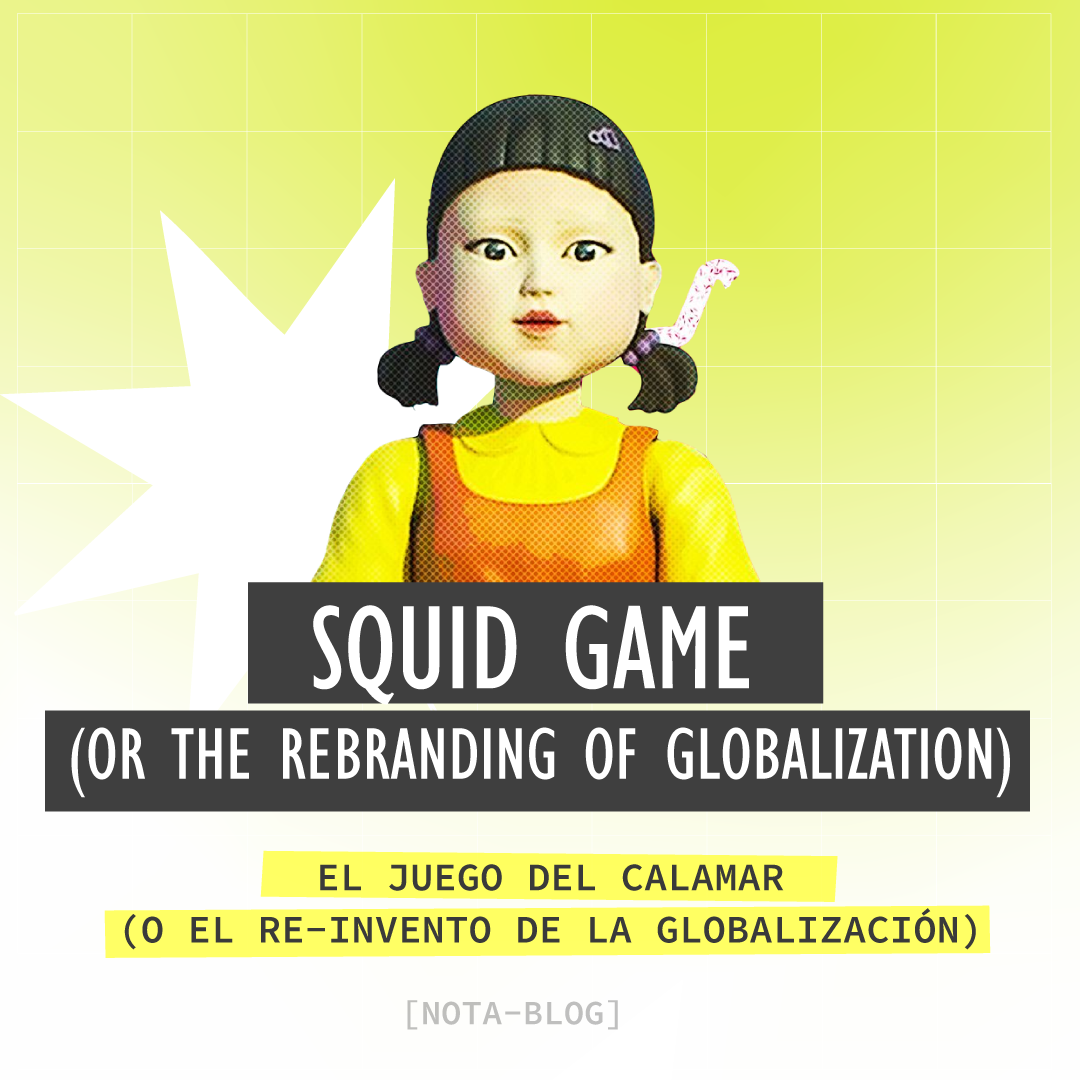For those of us who vividly remember the late 90’s and early 00’s, during which the internet gained more and more significance each passing year, the term “globalization” should sound very familiar.
While coined in the 18th century, the meaning we’ve been known to assign the term “globalization” dates back to 1989 as the Cold War was brought to an end and, consequently, so was the division of the world. Economic integration, migration, the development of a global market economy, technological advances (more specifically video calls and social media); these and many others were factors that slowly but surely wrote a bit of an international code that we learned to deem globalization, more specifically in terms of our culture.
Nevertheless, as I was watching this brand new —undoubtedly ingenious— Korean show, I came to a realization that I’m sure plenty others must have come to as well: Have we really been experiencing globalization? Or was our culture actually put through an Americanization (America as in the United States, not the continent) with just a few splashes here and there of international content that are only now becoming more notorious?
Needless to say there are plenty of people —more and more every day, fortunately— with an avid interest in Eastern cultures and their languages, particularly the Korean and the Japanese through their art (Kpop, cinema, anime, manga, etc.). However, when it comes to the “average” consumer, Squid Game might have been the very first representation of Korean culture that did not come from the United States, or at least, that was the case for me.
Are the United States solely to blame for this subconscious discrimination? After all, one might argue that our culture is also considerably Eurocentric. Regardless I think we can all agree on THE one divisive feature that stands out the most, which is language, more specifically one that has unified and yet at the same time somehow divided the world in the long run: English.
Think about it. Most of the songs we listen to, most of the shows we watch, the movies we’ve seen… practically every piece of content we consume has been originally written in English. Plenty of music bands (think Kpop or Jrock) have been known to sing in English as well as their native tongue in order to make their lyrics “more approachable”. In Squid Game itself, you’ll see them interact with foreigners —more specifically Philippines— in English.
Another phenomenon that shone a light upon Asian content —as well as how neglected it had been by Westerners this whole time— was the movie Parasite, also South Korean made, which in February 2020 became the very first non-English language film to win the Academy Award for Best Picture. How can we, then, claim to have been experiencing the peak of globalization all these decades when we couldn’t even be bothered to notice that every single one of the most globally acclaimed films of the year, every year, had always been exclusively in English?
Squid Game, being a nine-hour show rather than a fleeting two-hour film, has helped give us a better look at some Korean expressions, their intonations, perhaps even some words. Unfortunately, as plenty of fluent Korean speakers are pointing out on platforms like Tik Tok, the subtitles Netflix provides —especially the English ones— are “botching” the original dialogue, which according to them often gets lost, going as far as claiming none of it is actually preserved in translation. Because of the dominance of the English language, one might say, we cannot even properly appreciate genuinely international content.
What, then, is the solution to this? How can we develop an international code that is not as divisive as the one this Westerncentric culture has created?
Squid Game’s found it: children.
On the show (we won’t spoil it) it is implied that the one equalizing factor amongst all these characters (the young and the elder, the rich and the poor, the clever and the uneducated, the noble-hearted and the criminals alike) are games normally played by children. That same unifying factor has manifested into the real world upon the release of the series, as everyone all over the world began to realize their own culture had a version of those games, only under a different name. These games, such as ‘red light, green light’ or the ‘squid game’ itself, have existed since far before globalization and yet, there we were, people from all around the globe playing them, without knowing that children on the other side of the world were doing the exact same thing.
Could it be that children, for whatever reason, have less nuanced, less influenced skills of communication and comprehension that allow them to come up with concepts that could be applicable to children everywhere? Now that more and more schools are beginning to include in their syllabus languages other than English, and with non-English movies and shows such as these finally being granted recognition, could we be looking at the cusp of a rebranding of globalization? Could future generations help narrow the gap our Englishcentric line of thinking has unknowingly created?


El Juego del Calamar (o el re-invento de la globalización)
Para aquellos de nosotros que recordamos vívidamente los fines de los 90’s y principios de los 2000, durante los cuales el internet fue ganando más y más significación cada año, el término “globalización” nos es muy familiar.
A pesar de ser acuñado en el siglo XVIII, el significado que supimos asignarle al término “globalización” comenzó por el año 1989 en lo que terminaba la Guerra Fría, y consecuentemente también la división del mundo. La integración económica, la migración, el desarrollo de una economía de mercado global, avances tecnológicos (más específicamente videollamadas y redes sociales); estos y muchos más han sido factores que lentamente redactaron un código internacional que aprendimos a categorizar como globalización, más específicamente en nuestra cultura.
Sin embrago, mientras miraba esta nueva —sin duda ingeniosa— serie coreana, llegué a una conclusión a la cual de seguro muchas otras personas habrán arribado también: ¿en verdad hemos estado experimentando una globalización? ¿O acaso nuestra cultura atravesó una Americanización (América por los Estados Unidos, no el continente) con tan solo unos retazos de contenido internacional que solo ahora están volviéndose notables?
De más está decir que hay muchísima gente —cada día más, afortunadamente— con un ávido interés en culturas e idiomas Orientales, particularmente la coreana y la japonesa a través de su arte (Kpop, cine, anime, manga, etc.). Sin embargo, para el consumidor “promedio”, El Juego del Calamar debe haber sido la primera representación de la cultura coreana que no se haya originado en los Estados Unidos, o al menos ese fue mi caso.
¿Acaso solo los Estados Unidos tienen la culpa de esta inconsciente discriminación? Después de todo, uno podría decir que nuestra cultura es también bastante Eurocentrista. No obstante, creo que todo el mundo puede estar de acuerdo con que la característica divisiva más evidente es el idioma, más específicamente aquel idioma que ha unificado al mundo, y al mismo tiempo lo ha dividido al largo plazo: el inglés.
Piénsenlo. La mayoría de las canciones que escuchamos, de las series que miramos, de las películas que hemos visto… prácticamente todo tipo de contenido que consumimos ha sido escrito originalmente en inglés. Varias bandas de música (piensen en el kpop o el jrock) han cantado en inglés junto con su idioma natal a fin de que sus letras fuesen más “accesibles”. En El Juego del Calamar incluso, los vemos interactuar con extranjeros —más específicamente filipinos— en inglés.
Otro fenómeno que ha resaltado contenido hecho en Asia —como también lo mucho que los occidentales hemos estado ignorándolo todo este tiempo— fue la película Parasite, también hecha en Corea del Sur, la cual en febrero del 2020 se ha convertido en la primera película de habla no-inglesa en ganar el Premio de la Academia a Mejor Película. ¿Cómo podemos, entonces, decir que hemos experimentado el auge de la globalización todas estas décadas cuando ni siquiera supimos darnos cuenta de que cada una de las películas más internacionalmente aclamadas del año, todos los años, ha estado exclusivamente en inglés?
El Juego del Calamar, al ser una serie de 9 horas y no una efímera película de 2, nos ha ayudado a echar un vistazo a ciertas expresiones, entonaciones y tal vez hasta términos en coreano. Desafortunadamente, mucha gente de habla coreana ha estado señalando en plataformas como TikTok que los subtítulos de Netflix —especialmente los de inglés— “masacran” al diálogo original, el cual según ellos suele perderse, llegando a decir que prácticamente nada del mismo es conservado en la traducción. Dada la dominancia del inglés, uno podría decir, no podemos siquiera apreciar apropiadamente contenido genuinamente internacional.
¿Cuál es, entonces, la solución a todo esto? ¿Cómo podemos desarrollas un código internacional que no sea tan divisivo como el que la cultura occidental ha creado?
El Juego del Calamar lo encontró: los niños.
En la serie (no vamos a spoilear nada) queda implícito que un factor verdaderamente unifica entre todos estos personajes (jóvenes y ancianos, ricos y pobres, inteligentes e ignorantes, gente noble y criminales por igual) son los juegos normalmente jugados por niños. Ese mismo factor unificador se manifestó en el mundo real ante el estreno de la serie, cuando la gente alrededor del mundo notó que su propia cultura también contaba con versiones de aquellos juegos, solo que con otro nombre. Estos juegos, como ‘luz roja, luz verde’ o el mismo ‘juego del calamar’, existen desde mucho antes de la globalización y sin embargo, ahí estábamos, gente de todo el globo jugándolos sin saber que niños al otro lado del planeta estaban haciendo exactamente lo mismo.
¿Acaso los niños, por la causa que fuese, cuentan con habilidades de comunicación y compresión menos obstaculizadas o influenciadas que les permiten crear conceptos que aplican a niños en todo el mundo? Ahora que más y más escuelas están agregando a sus planes de estudio otros idiomas además del inglés, y con series y películas de habla no-inglesa por fin siendo reconocidas, ¿estaremos en presencia del comienzo de un reinvento de la globalización? ¿Podrán futuras generaciones cerrar la grieta creada por nuestro pensamiento anglocentrista?


Conocé más sobre nosotros en nuestra Página Web, Instagram, Facebook, LinkedIn, Blog, TikTok, Lasso, y aprendé inglés online.
Sumate a nuestro newsletter para recibir novedades sobre nuestros cursos.
Gracias a Camila Binetti por la nota, Cecilia Musis por la traducción al español, Araceli Sabransky por el diseño gráfico y gestión de redes y Christian Trappani por la organización.
